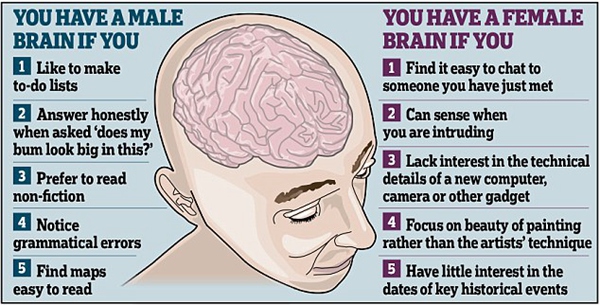

People with male brains (Type-S) tend to be better at analysing information
Those with a female brain (Type-E) excel at recognising others' feelings
Men with male brains earn 9.8% more than those with female minds
Women with male brains earn 6.3% more than Type-E peers
It is often said it is a man's world.
So it should perhaps be no surprise that the key to earning more is to think like a man.
A study found that Britons with a so-called male brain have higher salaries than those with a female brain.


New research by Anglia Ruskin University shows that workers with a 'male brain' earn significantly more than those with a 'female brain'. A stock image of business people are shown. Both men and women can have 'male brains' known as Type-S brains, or 'female brains' which are 'Type-E'
As a result, a woman with an analytical mind will earn 6.3 per cent more than a female who focuses on thoughts and feelings, despite both doing the job.
Researcher Nick Drydakis said it isn't clear why thinking like a man make workers better off but it may be because traditionally male occupations are better paid.
He said that if women are discouraged from entering professions dominated by men, this could be pushing down their pay and contributing to the gender pay gap.
Dr Drydakis's study centred around a theory promoted by Cambridge University researcher Simon Baron-Cohen that women's brains are generally hardwired for empathy, making them good at working out what people are feeling and responding appropriately.
Men, in contrast, tend to be better at 'systemising' - or dealing with patterns, rules and mechanics.
However, despite the labels, not all men have a 'male brain', and not all women have a 'female brain'.
To find out whether a person's brain type was linked to their earning power, Dr Drydakis studied detailed data on more than 16,000 Britons.
The men and women, from right across the country, supplied information about their occupation and salary.
They also filled in a detailed questionnaire to determine whether they had a 'male' or 'female' brain.
Someone with a 'male brain' might say that they would easily fix an electrical problem at home, while admitting that they would reply truthfully when their wife or girlfriend asks 'does my bum look big in this?'.
In contrast, someone with a 'female brain' might be flummoxed by DIY but would be more considerate of feelings.
The results revealed that, overall, those with 'male' brains earned more.
On average, a man with a 'male brain' earned 9.8 per cent more than one with a 'female brain', while a woman with a 'male brain' earned 6.3 per cent more.

The study found that having a male brain is linked to higher wages in management, administration, IT, engineering and banking. A stock image of an engineering setting up a lathe is shown above

Cognitive studies have shown that men score significantly higher on the systemising questionnaire (the desire to construct or analyse systems), while women score significantly higher on the empathising questionnaire. A stock image of a woman consoling and empathising with her friend is shown
However, some patterns of thinking bring greater rewards in some occupations than others.

Having a 'male brain' brings higher salaries in management, administration, IT, engineering and banking, while having a 'female brain' helps get a pay rise in teaching, social work, skills and customer services.
Dr Drydakis said that caring occupations value people skills, whether they are exhibited by a man or a woman.
Finally, some people have a brain that is equally as good at systemising as it is at empathising.
Such people haves brainpower devoted to systemising than those with 'male' brains but more than those with 'female' brains, which could help explain why their salaries fell in the middle.
Dr Drydakis, whose research has been published by the IZA, the German-based Institute for the Study of Labour, said that British bosses reward those who think like a man.
He said: 'Overall, the results show employees with higher systemising traits, or a 'male' brain, receive greater financial rewards in the UK labour market'.
'The results also suggest that men and women in certain occupations face positive wage rewards when their empathising and systemising traits are atypical to their gender, for example men with a female brain working in social care or women with a male brain working in banking.'

People with a female brain earn higher wages in sectors such as education (stock image) social care and sales where empathising traits may be a better fit for these jobs' requirements, than workers with a male brain
 Cats who immediately regretted their life choices in photographs
Cats who immediately regretted their life choices in photographs Beautiful girl from police college becomes Internet hit
Beautiful girl from police college becomes Internet hit 10 tons of copper coins unearthed in 2,000-yr old tomb
10 tons of copper coins unearthed in 2,000-yr old tomb In Pics: Amazing Chinese fighters
In Pics: Amazing Chinese fighters
 When a Chinese woman marries an Indian man
When a Chinese woman marries an Indian man Love beyond limit of heights in the world
Love beyond limit of heights in the world
 Photos of beautiful teacher hit the Internet
Photos of beautiful teacher hit the Internet Transparent Over-cliff Path Cracked Suddenly
Transparent Over-cliff Path Cracked Suddenly Russian helicopter lands safely after being attacked in Syria
Russian helicopter lands safely after being attacked in Syria Top 20 hottest women in the world in 2014
Top 20 hottest women in the world in 2014 Top 10 hardest languages to learn
Top 10 hardest languages to learn 10 Chinese female stars with most beautiful faces
10 Chinese female stars with most beautiful faces China’s Top 10 Unique Bridges, Highways and Roads
China’s Top 10 Unique Bridges, Highways and Roads Fare changes
Fare changes Beyond Movember
Beyond Movember Repairing a wrecked reputation
Repairing a wrecked reputation Washington losing leverage in S.China Sea
Washington losing leverage in S.China SeaDay|Week